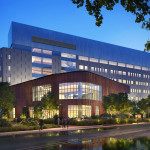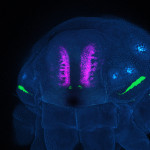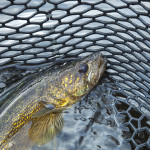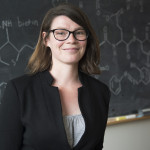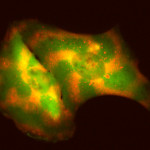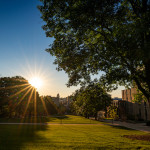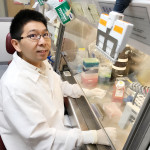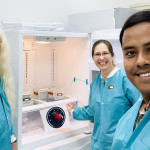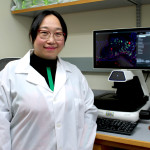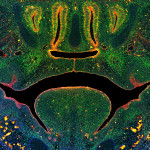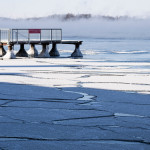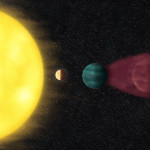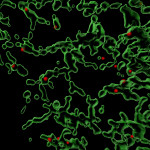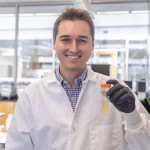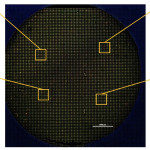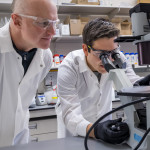Category Science & Technology
Q&A with Prof. Steffi Diem, a UW–Madison fusion scientist and 2024 U.S. Science Envoy
Diem, a fusion energy expert, specializes in heating the ultra-hot fuel for fusion and confining it within efficient and compact magnetic bottles. Her selection as one of four new U.S. Science Envoys highlights growing recognition of fusion's role in building a clean and renewable energy future.
The eyes are a gateway to evolution… of daddy longlegs at least.
While some people may first associate daddy longlegs with well, their legs, researchers from the Department of Integrative Biology have been especially focused on the arachnids’ eyes and what they can tell us about their evolution.
Walleye struggle with changes to timing of spring thaw
Newly-hatched walleye are hungry fish, dependent on meals of tiny zooplankton during the spring. As Midwestern lakes thaw unusually early or late, these prized fish can miss the dinner bell.
New toolkit helps scientists study natural cell death
Taking advantage of the unique biochemical properties of protein fragments, their tool uses less expensive, more efficient, off-the-shelf chemical compounds to help identify sites where proteins were cut.
Programming cells to organize their molecules may open the door to new treatments
Biochemists at UW–Madison have developed a tool to control how certain proteins move in mammalian cells, a discovery that has multiple potential uses for treating or studying diseases by engineering specific cellular activities or studying cellular activity in a living organism.
UW–Madison researchers first to 3D-print functional human brain tissue
It’s an achievement with important implications for scientists studying the brain and working on treatments for a broad range of neurological and neurodevelopmental disorders, such as Alzheimer’s and Parkinson’s disease.
These tomatoes are out of this world… or they will be soon
By sending tomato plants to the International Space Station, UW researchers hope to better understand how plants grow without gravity and whether there are ways to help plants cope with the stressors involved with growing in space flight.
Chats with AI shift attitudes on climate change, Black Lives Matter
Researchers studying AI wanted to understand how one complex large language model, GPT-3, would perform across a culturally diverse group of users in complex discussions.
How ’bout that weather we’re having? A Q&A with Wisconsin’s State Climatologist.
This year, the onset of cold temperatures, substantial snowfall and ice over on some Wisconsin's most iconic lakes happened later than usual. Why?
National committee co-chaired by Chancellor Mnookin issues report on facial recognition technology
Chancellor Jennifer L. Mnookin co-chaired a National Academies of Sciences, Engineering, and Medicine committee that issued a report recommending the federal government take action to address privacy, equity and civil liberties concerns in light of facial recognition technology that has outpaced laws and regulations.
Earth-sized planet discovered in ‘our solar backyard’
A team of astronomers have discovered a planet closer and younger than any other Earth-sized world yet identified. It’s a remarkably hot world whose proximity to our own planet and to a star like our sun mark it as a unique opportunity to study how planets evolve.
UW–Madison scientists reveal the inner workings of an essential protein trafficking complex
The discovery could eventually help researchers better understand and develop new treatments for diseases like cancer, diabetes and those that cause immune dysfunction.
Multitasking microbes: UW–Madison scientists engineer bacteria to make two valuable products from plant fiber
UW researchers have engineered bacteria that can produce two chemical products at the same time from underutilized plant fiber. The discovery could help make biofuels more sustainable and commercially viable.
Stem cell technology developed at UW–Madison leads to new understanding of autism risks
Ashton says researchers using technologies like the RosetteArray are finding that the risk factors for autism spectrum disorder are boiling down to a couple of core pathways, that seem to have roles very early in human brain development, which is helpful information as researchers work on treatments.
Mineral coatings could enable shelf-stable mRNA therapies
A protective mineral coating identified by University of Wisconsin–Madison biomedical engineering researchers could allow powerful messenger RNA therapeutics like COVID-19 vaccines to be stored at room temperature, making them more accessible to lower-resourced communities across the world.


